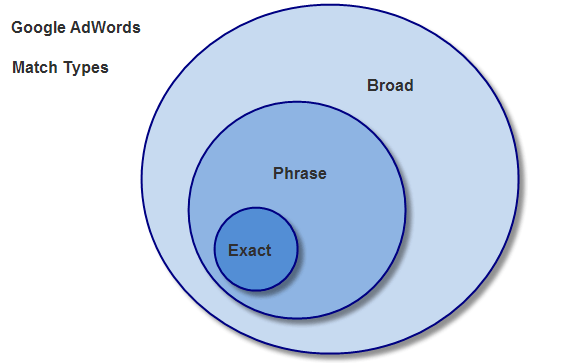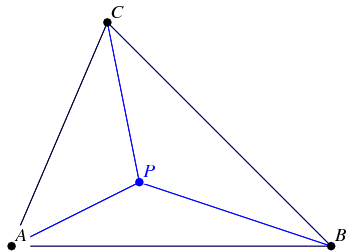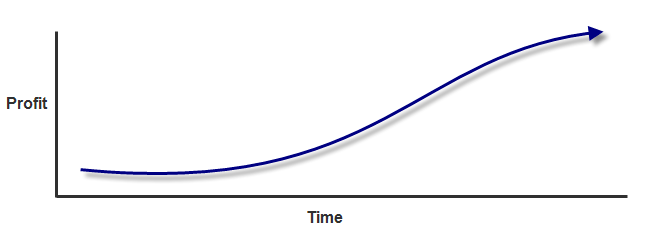One of the most common mistakes we see in a Google Ads campaign setup by your average guy is the misuse of keyword match types. Google seem to make the process of building a campaign very easy for an average small business owner looking to buy some digital advertising space on the Google high street. It is pretty obvious why it is made this easy in our opinion; it makes Google a lot of money.
In the same way, buying a chainsaw is easy; using it without making a mess, requires some knowledge and foresight and can be dangerous. Paying Google the token £5 for the account and then adding a few keywords is easy, but setting up a well structured campaign that will deliver you a return on investment does require a little more knowledge.
It would be easy to make the mistake that a keyword is a keyword, when in fact there are different keyword match types which can be used in a multitude of ways and for varying reasons. In most campaigns we see set up by someone with no experience in managing Google Ads, we see the same thing; a whole load of keywords, if not all keywords, set to ‘Broad match’ and spread over a couple of ad groups. This is in fact an almost acceptable mistake to make, I mean Google have set the default match type to ‘Broad’. Now is a good time to run through the different Google Ads keyword match types.
Match Types
Essentially there are four different match types for keywords; these are ‘Exact’, ‘Phrase’, ‘Broad’ and ‘Broad Match Modifier’.
- Exact = the keyword must be written exactly as you have written it when someone searches for it in Google.
- Phrase = the keyword must be within a “phrase”, before or after another word or phrase and must be written exactly as you have written it.
- Broad = your keyword can be substituted for other words Google feels are relevant, it can be within a phrase, the order of words can be changed and other words can come before or after it.
- Broad Match Modifier (BMM) = they search term must contain all of the words included in the keyword.

To offer a real world example I will use the keyword “dog leads” as an example.
Exact Match would mean that the keyword has to appear exactly as you have written it, so only people who type in “dog leads” will trigger your ad being displayed. Google have more recently extended this to allow close variants and relevant terms to trigger your exact match keyword. For instance, the terms ‘dog lead’ and ‘lead for dog’ may show through your exact match keywords.
A Phrase match would mean that your ad could be triggered if someone searched for “extendable dog leads”, “blue dog leads for small dogs”, or “dog leads uk”… It could also display if someone were to type “dog leads” on its own even if you have an exact match version of the keyword in the ad group or campaign. Ads would not show though if someone searched for “dog retractable leads” as the original keyword needs to be embedded within a phrase intact.
Broad match type could trigger ads for the largest possible amount of variables, it would display for both of the above match types regardless of whether they already exist within the campaign as well as many more. For example; “extendable dog lead uk”, “dg leeeds”, and “leads for small dogs” could potentially trigger your ads. Broad match keywords could also trigger searches for ‘dog bowls’, ‘dog jackets’ or possibly even ‘cat leads’. Whatever Google deems to be relevant to the search.
Your broad match modifier keyword in this case would be +dog +leads. The user’s search query must contain both of those words, but can be in any order. BMM is similar to phrase, but the order of the query doesn’t matter, making BMM keywords a much better choice. We would appear for terms such as ‘buy leads for dog online’ but could also appear for some irrelevant terms such as ‘how long can a dog be kept on a lead’.
So Exact match keywords are good for keeping a tight lid on when ads are displayed, Phrase match expands the scope of that considerably, Broad match opens it up to the largest possible audience, but BMM keywords do everything that phrase match can do and more and are not as risky as broad. As a result we highly recommend using a blend of exact and BMM keywords in your account. It is our aim to have as many exact match keywords in the account as possible as these typically have cheaper costs, but BMM keywords are used to mine for new search opportunities.
Negative Keywords
 BMM, Broad and Phrase match keywords need to be restricted in terms of what search terms will trigger the ads; because Google may think that “sales leads” is an acceptable variant of “dog leads” or “blue dog leads” may not be something that you stock. In order to restrict the display of keywords you will need to use ‘negative keywords’. Keywords like this are often added at the campaign level, because campaigns should not be too broad in there scope of products or services; although the same result can be achieved through adding them at ad group level.
BMM, Broad and Phrase match keywords need to be restricted in terms of what search terms will trigger the ads; because Google may think that “sales leads” is an acceptable variant of “dog leads” or “blue dog leads” may not be something that you stock. In order to restrict the display of keywords you will need to use ‘negative keywords’. Keywords like this are often added at the campaign level, because campaigns should not be too broad in there scope of products or services; although the same result can be achieved through adding them at ad group level.
Negative keywords use match types in the same way that normal or positive keywords do. So continuing the example above, by adding “sales leads” as a broad match negative keyword, you’ll prevent your ad from being displayed if anyone searches for “sales leads” or a variant of it. Adding “blue” as a phrase match negative keyword will prevent your ads from being displayed if the word “blue” is used within the search term.
Using the ‘Keyword Tool’ in Google Ads will highlight the importance of proper and thorough negative keyword research; a quick search brings up 800 broad match variations of the keyword including “dog seat belt harness” and “bicycle dog carrier”.
But why is this so vital to the success of the campaign? Because no matter whether the searcher clicks or doesn’t click on, your ad it will have a negative impact. The obvious one is that someone clicks on the ad and find that you do not sell what they are looking for and you have paid good money for the privilege. If this were to happen, you can see what people had searched for in the ‘Search Terms’ for the keyword and preclude this from occurring again by adding it as a negative keyword.

The less obvious impact and one much harder to detect is if they do not click the ad. This means that you cannot see what search term triggered the ad, so you cannot exclude it later. But moreover it will count as an impression, and the ratio of clicks to impressions determines the Click through Rate (CTR). The CTR is a major factor in determining the relevance of your ads to the searcher; as such, a poor CTR will affect your Quality Score. A reduced Quality Score will affect the Cost per Click making it more expensive, meaning the Cost per Conversion is higher. Once the Cost per Conversion is greater than the value of a conversion, you are officially making a loss.
Triangulation and Ad Group Level Negative Keywords
 The restrictive capacities of negative keywords and the increasing broadness of match types can be used in conjunction with one another to create an effective strategy beyond simply improving CTR. Using a method called Triangulation, ad groups can be constructed based on match types to create highly targeted campaigns.
The restrictive capacities of negative keywords and the increasing broadness of match types can be used in conjunction with one another to create an effective strategy beyond simply improving CTR. Using a method called Triangulation, ad groups can be constructed based on match types to create highly targeted campaigns.
I will maintain the example of dog leads as a keyword in the next illustration. Three ad groups will need to be created; each contains the keyword “dog leads” and each is set to a different match type. So now you have an Exact, Phrase and Broad match version of the same keyword each in its own ad group.
- In the Broad match ad group; add “dog leads” as a Phrase match negative keyword (at ad group level).
- In the Phrase match ad group; add “dog leads” as an Exact match negative keyword (at ad group level).
No negative keywords are required when using Exact match keywords because no variation of it can trigger an ad to be displayed. The effect this has is that:
- When someone searches for the exact term, the ad in the exact match ad group will be triggered.
- When someone searches for the term within a phrase, the ad in the phrase match ad group will be triggered.
- When someone searches on a broad match variant of the keyword, the ad in the broad match ad group will be triggered.
This means that the ad text for the exact match ad group can be targeted specifically for the exact keyword. Similarly the phrase match ad groups ad text could use keyword insertion or be designed to be slightly broader such as “Many Different Types of Dog Leads”. The broad match ad group will also have its own slightly broader ad text or a keyword insertion.
The primary benefit of this is greater relevance to the search term / searcher through relevant ad text. Also, this allows you to identify new opportunities brought about by the use of broad match keywords without compromising on relevance. It should be noted that proper keyword research should / must be done in order to prevent your ads from being displayed to irrelevant search terms as described in the “Negative Keywords” section above.
 Breaking your ad groups down into match types and having unique ad text for each will help especially when split testing your ads. In an ad group, any given ad with mixed match types will likely perform at varying degrees of success depending upon the search term, but you will be unable to determine how or why. Triangulation removes that unknown and replaces it with more easily quantifiable measures of success.
Breaking your ad groups down into match types and having unique ad text for each will help especially when split testing your ads. In an ad group, any given ad with mixed match types will likely perform at varying degrees of success depending upon the search term, but you will be unable to determine how or why. Triangulation removes that unknown and replaces it with more easily quantifiable measures of success.
Summary
As we have hopefully explained, simply adding 100 keywords on broad match to a campaign, setting a budget and putting it live is far from a well constructed campaign. Pay Per Click (PPC) advertising is a Return on Investment (ROI) strategy, but in order to generate ROI, the campaign needs to be targeted properly and effectively. Bear in mind that your competition is probably successfully using negative keywords, triangulation, targeted ad text and subjecting the campaigns to constant optimisation. Unless you compete at the same level you can be left behind or end up paying more for irrelevant traffic and achieving little more than increasing Google’s profits. It is very important that we understand Google Ads keyword match types and use them to our advantage. Any top PPC account will use a variety of match types, but ultimately, the aim is to add as many exact match keywords as possible. This match type ensures searches are relevant to the products/services we sell and will bring down our CPCs, improving performance of the account.


Leave a Reply